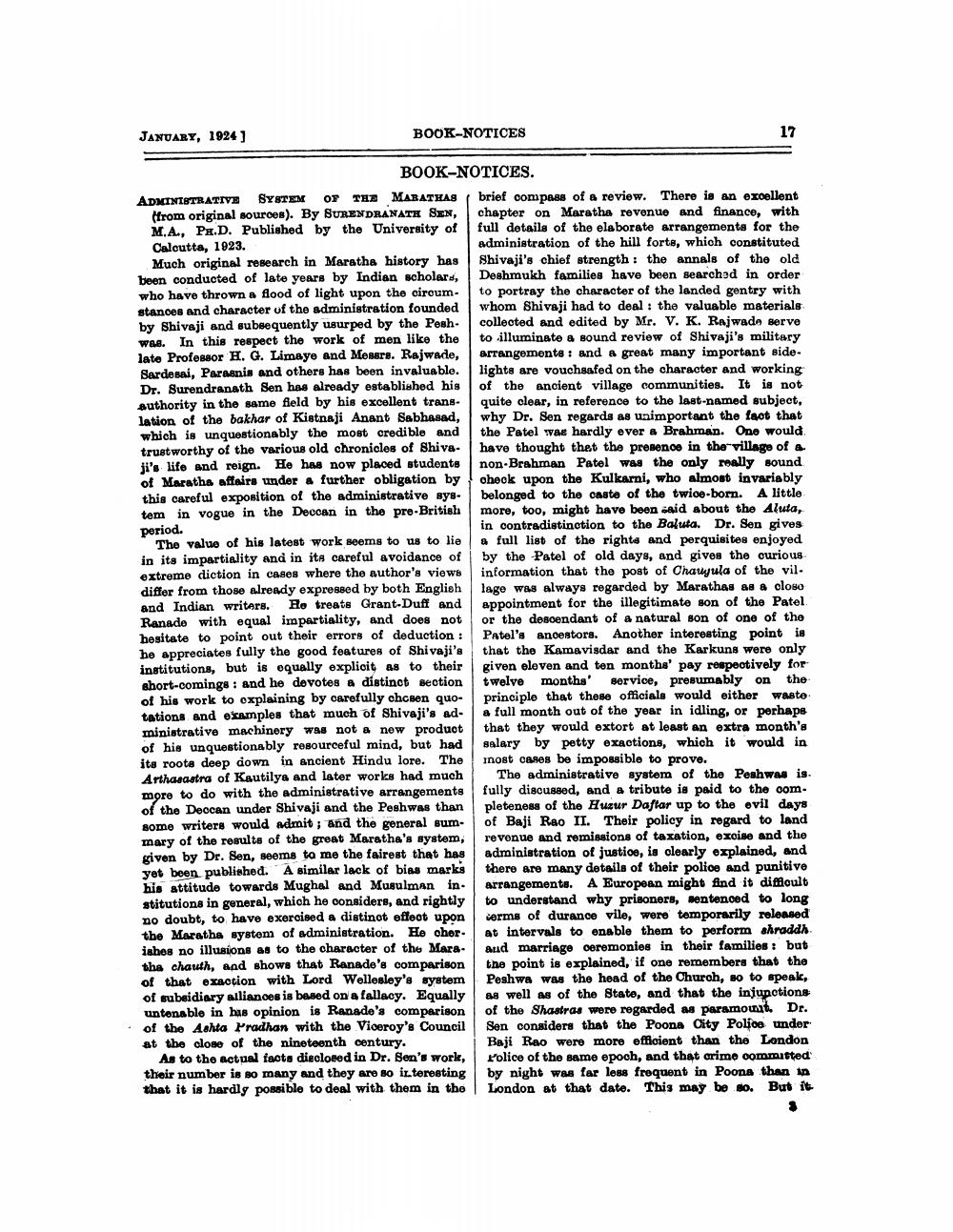________________
JANUARY, 1924 ]
BOOK-NOTICES
period.
BOOK-NOTICES. ADMINISTRATIVE SYSTEM OF THE MARATHAS brief compass of a review. There is an excellent
(from original sources). By SURENDRANATH SEN, chapter on Maratha revenue and finance, with M.A., PA.D. Published by the University of full details of the elaborate arrangements for the Caloutta, 1923.
administration of the hill forts, which constituted Much original research in Maratha history has Shivaji's chief strength : the annals of the old been conducted of late years by Indian scholard, Deshmukh families have been searchod in order who have thrown a flood of light upon the circum- to portray the character of the landed gentry with stances and character of the administration founded whom Shivaji had to deal : the valuable materials by Shivaji and subsequently usurped by the Pesh. collected and edited by Mr. V. K. Rajwada serve WA. In this respect the work of men like the to illuminate & sound review of Shivaji's military late Professor H. G. Limaye and Messrs. Rajwade, arrangements : and a great many important sideSardesai, Parasnis and others has been invaluable. lights are vouchsafed on the character and working Dr. Surendranath Sen has already established his of the ancient village communities. It is not authority in the same field by his excellent trans- quite clear, in reference to the last-named subject, lation of the bakhar of Kistnaji Anant Sabhasad, why Dr. Sen regards as unimportant the fact that which is unquestionably the most credible and the Patel was hardly ever a Brahman. One would trustworthy of the various old chronicles of Shiva. have thought thet the presence in the village of a ji's life and reign. He has now placed students non-Brahman Patel was the only really sound of Maraths affairs under a further obligation by check upon the Kulkarni, who almost invariably this careful exposition of the administrative sys- belonged to the caste of the twice-born. A little tem in vogue in the Deccan in the pre-British more, too, might have been said about the Aluta,
in contradistinction to the Baluta. Dr. Sen gives The value of his latest work seems to us to lie a full list of the rights and perquisites enjoyed in its impartiality and in its careful avoidance of by the Patel of old days, and gives the curious extreme diction in cases where the author's views information that the post of Chaujula of the vil. differ from those already expressed by both English lage was always regarded by Marathas 88 & closo and Indian writers. He treats Grant-Duff and appointment for the illegitimate son of the Patel Ranade with equal impartiality, and does not or the descendant of a natural son of one of the hesitate to point out their errors of deduction : Patel's ancestors. Another interesting point is ho appreciates fully the good features of Shivaji's that the Kamavisdar and the Karkuns were only institutions, but is equally explicit as to their given oloven and ten months' pay respectively for short-comings: and he devotes a distinct section twelve months' service, presumably on the of his work to explaining by carefully chosen quo- principle that these officials would either waste tations and examples that much of Shivaji's ad- a full month out of the year in idling, or perhaps ministrative machinery was not a new product that they would extort at least an extra month's of his unquestionably resourceful mind, but had salary by petty exactions, which it would in its roots deep down in ancient Hindu lore. The Inost cases be impossible to prove. Arthasastra of Kautilya and later works had much The administrative system of the Peshwas is. more to do with the administrative arrangements fully discussed, and a tribute is paid to the oom. of the Doocan under Shivaji and the Peshwas than pleteness of the Huzur Daftar up to the evil days some writers would admit; and the general sum- of Baji Rao II. Their policy in regard to land mary of the results of the great Maratha's system, revenue and remissions of taxation, excise and the given by Dr. Sen, seems to me the firest that has administration of justice, is clearly explained, and yet been published. A similar lack of bias marks there are many details of their police and punitivo his attitude towards Mughal and Musulman in. arrangements. A European might find it difficult stitutions in general, which he considers, and rightly to understand why prisoners, sentenced to long no doubt, to have exercised a distinct effect upon ierms of durance vile, were temporarily released the Maratha system of administration. He chor. at intervals to enable them to perform ahraddh ishos no illusions as to the character of the Mara- and marriage ceremonies in their families: but tha chauth, and shows that Ranade's comparison the point is explained, if one remembers that the of that exaction with Lord Wellesley's system Peshwa was the head of the Church, so to speak, of subsidiary alliances is based on a fallacy. Equally as well as of the State, and that the injupotions untonable in his opinion is Ranade's comparison of the Shastras were regarded as paramouutDr. of the Ashta Pradhan with the Viceroy's Council Sen considers that the Poona City Police under at the close of the nineteenth century.
Baji Rao were more efficient than the London As to the actual facts dieclosed in Dr. Sen's work, Police of the same epoch, and that arime committed their number is so many and they are so interesting by night was far less frequent in Poona than in that it is hardly possible to deal with them in the London at that date. This may be so. But it.




